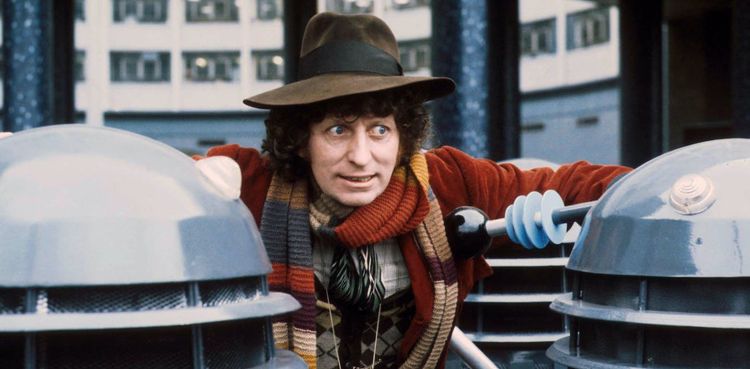Doctor Who 60: show has always tapped into political issues – but never more so than in the 1970s

During a significant era in British television, Doctor Who made its debut on Saturday November 23, 1963, at 5.15pm. This momentous occasion was slightly overshadowed by the tragic occurrence of John F. Kennedy's assassination the day before.
Doctor Who quickly found a home amongst the BBC's principles of providing information, education, and entertainment to the public. As a result, it became a popular choice for Saturday night viewing. In fact, by 1965, it had amassed a viewership of roughly 10 million people.
During its past, Doctor Who has explored topics relating to politics, society, and moral values, with some instances being more direct while others more implicit. Back in the 1970s, when the character of the Doctor was portrayed by the actors Jon Pertwee and Tom Baker, various instances of this were observed.
The 70s Doctor Who
During the 1970s, society and politics were marked by intense divisions. The government and unions had a difficult relationship in the early part of the decade, as evidenced by the miners' strikes in 1972 and 1974. The widespread agreement that had existed since 1945 was being challenged, with discussions of potential Welsh and Scottish Assemblies threatening to split up the United Kingdom.
James Chapman, a historian specializing in television, wrote a book called Inside the Tardis, which explores the cultural significance of Doctor Who. According to Chapman, the show during the 1970s portrayed a dark and eerie version of what British society could potentially become.
The Doctor Who episodes from that era were ambiguous as to whether they took place in the present or a future time. In one scene, Brigadier Lethbridge-Stewart of the United Nations Intelligence Task Force (UNIT) referred to the prime minister as "Madam" over the phone, which hints at a future setting.
When it comes to certain stories that deal with politics, The Green Death (1973) is definitely one of them. Fans refer to it as "the one with the giant maggots". This story doesn't hold back on anything. It's known as an "eco disaster narrative" according to Chapman. It shows a fight between corporate greed and capitalism with environmental activists. The activists in this story are portrayed as Welsh hippies who care about the planet.
The show portrays Global Chemicals, which is operated by an anonymous entity, as disposing of waste from its petrochemical facility into an abandoned mine in the valleys of southern Wales (resulting in negative Welsh stereotypes). The toxic sludge causes fatalities and spawns mutant maggots that attack. Given the increasing concern of the general public regarding environmental issues during the early 1970s, this plotline would likely have struck a chord with many viewers.
In the episode The Curse of Peladon (1972) of Doctor Who, the Doctor travels to the planet Peladon. The planet is trying to become a member of the Galactic Federation. Some people on the planet support joining the Federation, while others are against it. Those who are against it strongly believe that becoming a part of the Federation would ruin their traditions and culture.
Does this ring a bell? Back then, Britain was in talks to become a member of the European Economic Community, which happened in 1973. It's worth noting that this show was on air while the miners' strike of 1972 was happening, which caused a lot of viewers to miss some episodes because of power shortages.
The next chapter, The Beast of Peladon (1974), takes place amidst a setting of labor unrest and dispute concerning the workers in the mines.
Many people believe that Genesis of the Daleks (1975) is one of the greatest classic serials. In this show, Tom Baker's doctor kept up the tradition of exploring deep political, social, and ethical problems.
The Time Lords have transported the Doctor to the past to alter history. At a certain moment, he gets the chance to wipe out the mutations that shape the core of the Dalek creatures (the squishy part within their armored shells) and get rid of the Dalek civilization once and for all. Being on the verge of creating a blast in the containment chamber with two wires held closely together, he ponders this question together with his companions: "Do I possess the authority to do that?"
He claims to possess the power to foresee upcoming events, and according to him, forthcoming celestial bodies will join forces to combat the malevolent Daleks. Is it his prerogative to alter the path of history? Considering the imagery employed in the tale (gestures of respect, dark clothing, allusions to racial purity), it unmistakably referenced the emergence of the Nazi regime.
The use of political symbolism didn't stop in the 1970s, as evidenced in the television series The Happiness Patrol from 1988. The show features a villain named Helen A (portrayed by actress Sheila Hancock) who is an oppressive and despotic ruler, believed to be fashioned after former Prime Minister Margaret Thatcher, a member of the Conservative party. The striking resemblance between Hancock's portrayal and Thatcher strengthens this assertion.
Those who claim that Doctor Who's return in 2005 brought a higher dose of politics into its storylines simply haven't delved far enough into its history. Luckily, we can now explore over six decades' worth of episodes, as the BBC has made over 800 of them available on iPlayer. This extensive collection should make it obvious to everyone.
Doctor Who, particularly in the era of the 1970s, has constantly been inclined towards a political stance.
Want to find the best stuff? Avoid all the distractions and get a thoughtfully handpicked assortment of the newest products, shows, and displays, delivered to your email every two weeks, on Fridays. Enroll now.









































